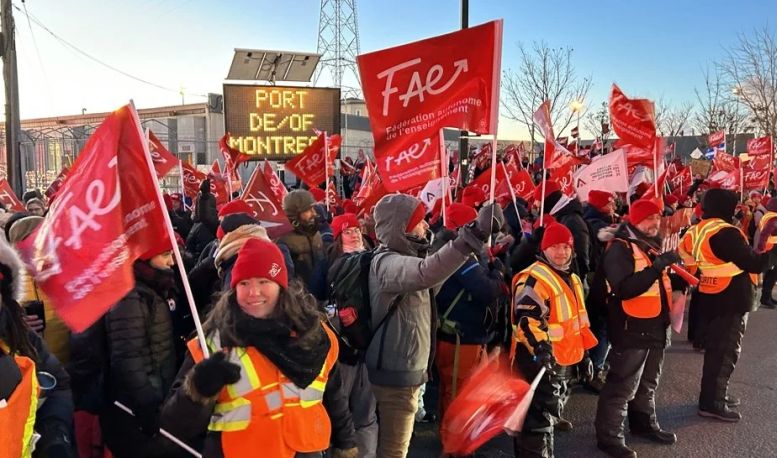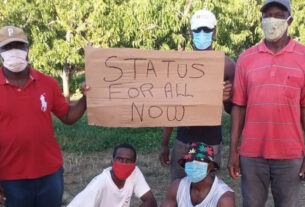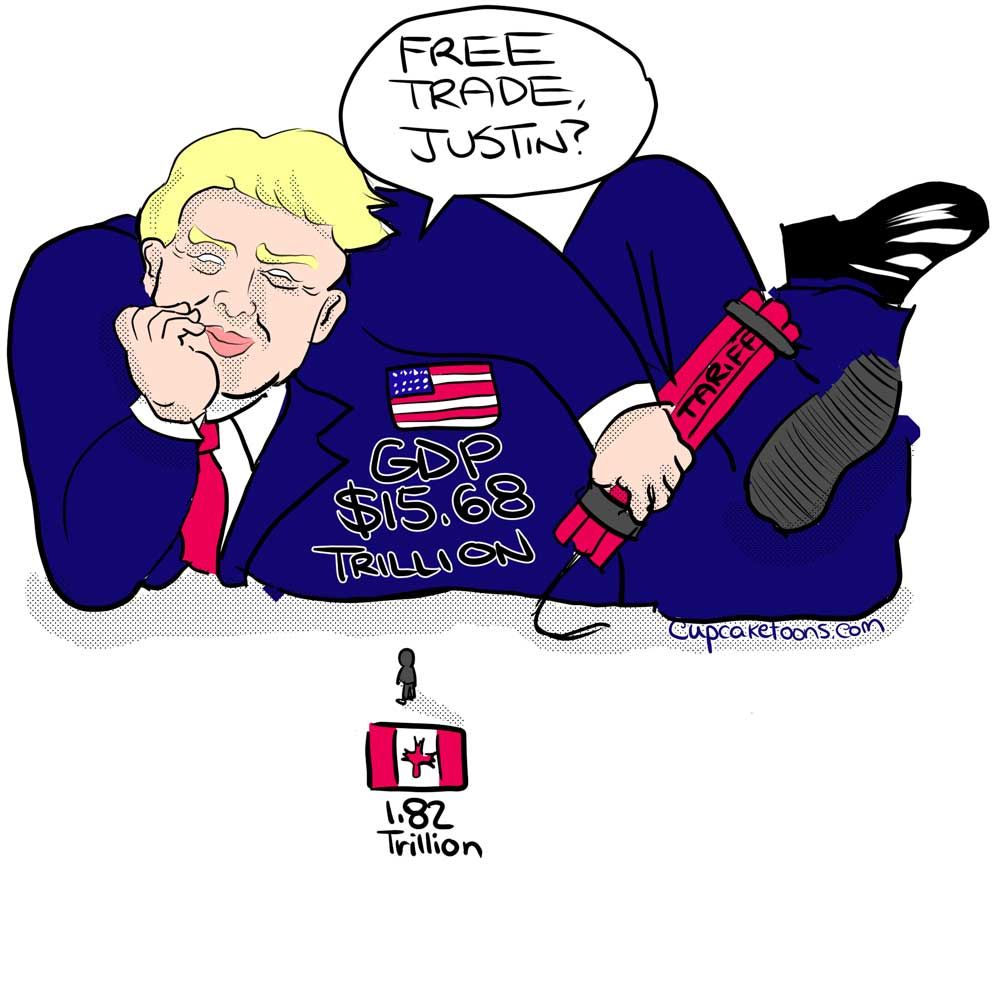After two months of rolling public sector strikes, starting on November 6, involving up to568,000 workers, the government of Québec has put forward an improved offer to the Common Front and another union, which the unions are putting to their members for a vote. There were two million strike days in November alone.
The Common Front involved 420,00 workers in four union federations. The Common Front was planning for an all-out strike at the start of 2024 if the government did not make a better offer. Also in dispute were 80,000 nurses and other health professionals (members of FIQ), who held their first strikes in 25 years. Over 65,000 teachers started (members of FAE) an all-out strike on November 23.
This mass mobilization is in sharp contrast to the weak public sector workers’ campaigns in BC and Ontario in 2022.
The Inter-Union Common Front and the Québec government reached a tentative agreement on December 28. It is currently being voted on by the unionized workers. But is this agreement worthy of the sacrifices made so far? If the goal was to restore purchasing power, then the answer is no.
Originally, the Common Front’s wage demand had two components: an increase of 9 percent over three years (to catch-up on lost purchasing power) and an annual increase to compensate for inflation. With inflation forecast at around 3 percent for the next few years, this would amount to around 18 percent over three years.
The government’s original offer before the strike was 9 percent over 5 years (a cut in real wages) and increased “flexibility” (worse conditions). This offer was increased in early December to 12.7 percent over five years.
The current salary agreement proposal only guarantees 12.4 percent for the first three years and 17.4 percent over the five-year contract, accompanied by a purchasing power protection clause of up to 1 percent for the last three years of the collective agreement. In total, the wages would increase up to 20.4 percent over five years.
Public sector workers were preparing themselves to gain more than slow impoverishment, before their job strikes in fall and winter 2023. Were their initial expectations too high?
An Offer that Does Not Cover Inflation
It has been claimed that this is the best proposed public sector deal in decades. However, previous agreements need to be considered in context. Workers are facing the worst crisis of capitalism in years. Debts, the price of housing, gasoline and groceries are exploding, while wars and unprecedented climate disaster fuel inflation.
With inflation over the last three years over 12.2 percent, Québec public sector employees have seen their purchasing power decline following the negotiations of their 2020-2023 contracts. Lower paid workers received salary increases of 10.4 percent over this time, while the salaries of the vast majority of workers increased around 7 percent.
Public sector employees began the 2023 negotiations with a shortfall in earnings, in addition to having to catch up with 3.6 percent inflation in 2023. Yes, a 6 percent raise may seem big for 2023. But it is much less of a raise as inflation has already mostly eaten it up! A truly exceptional agreement should allow everyone to catch up with the inflation of recent years. The workers’ original demand of inflation component of at least $100 a week increase or an adjustment linked to the Consumer Price Index would have done the trick!
A Slow Improvement that Masks a Deterioration
According to the Institut de la statistique du Québec, Québec public sector workers have experienced a slow improvement in their overall compensation (salary and benefits) of 10.1 percent over the past 40 years. However, their compensation is 7.4 percent behind all other provincial employees.
This relative impoverishment bears witness to decades of PQ, Liberal and then CAQ (current right wing government) attacks on public service working conditions. In addition to driving down real wages, these successive governments have sabotaged public services by reducing access, abolishing tens of thousands of jobs, intensifying work, subcontracting and privatizing.
During the capitalist crisis of the 1980s, the PQ government of René Lévesque resorted to austerity in Québec to defend corporate profits. The unions’ leadership began to bow to injunctions and to special laws decreeing working conditions.
The labour leaders’ lack of strategy and political vision pushed them to sign agreements at all costs, even at the expense of their members. This approach, according to which one appeases the aggressor instead of confronting him, locked the union movement into a spiral of defeats which is still felt today. The union leaders had abandoned the strategy of building an economic power based on strikes and direct action.
But in the current situation where members of the Québec National Assembly voted themselves a 30 percent raise and grocery store corporations are making record profits, public sector workers recognized the need to use strike action to win their case. Their union leaders could not ignore this and had to adjust.
The Strike made Québec Move
In addition to the 11 days of strikes by the Common Front, the month-long all-out strike of the FAE teachers was decisive in giving the workers the balance of power. The sacrifices of the teachers resonated with Québecers and the media. A Léger poll found 82 percent support for raising teachers pay. Support networks and several private sector unions have offered financial and food support to striking teachers in the run up to the holiday season. This solidarity undermined the CAQ’s ability to use the police or back-to-work legislation to force the teachers back into the schools.
So far, the labour conflict has been punctuated by three massive strike waves of increasing duration, as well as the teachers’ indefinite strike. Both in terms of number of people mobilized and number of strike days, this is unprecedented in the last 50 years!
The Workers’ Power Still has Potential
In the fall, the union members voted almost unanimously for strike action including an indefinite strike. The workers of the Common Front can still play this ultimate card to get satisfaction.
In the first week of January, the intermediate union delegations from the four Common Front union federations strongly endorsed the agreement in principle concluded between the leadership and Québec government. But the negotiations are not over yet! The agreement still needs to be put to a vote by the membership in the coming weeks.
With a bit of enthusiasm and the right arguments, it is possible to restart job action and to continue the momentum of December’s actions. This is the case even if workers’ motivation for strikes is lower at the moment.
Employer concessions in sectoral agreements on specific working conditions (bonuses, vacations, pay equity) may have tipped the balance in certain intermediate union delegations. However, they will have to justify to their members the reasons why they are recommending the agreement.
Negotiations: A Political Struggle Against the CAQ!
This labour conflict — the largest in Québec history — does not only have an economic dimension. These negotiations also have a political importance. On December 9, the government adopted a reform of the health sector (agence Santé Québec) under a gag order, leading to the hyper-centralisation of health services. The government’s repeated demands for greater “flexibility” in terms of workers’ schedules is linked to this change — they want to be able to direct workers to different locations, regardless of long travel times.
A window of opportunity to fight against this attack is at risk of closing with the acceptance of the current proposed agreements. Furthermore, if an agreement in principle is accepted by the members of the Common Front and the teachers in FAE, the nursing members of the FIQ will find themselves isolated. The pressure will be extreme for their union to sign an agreement as quickly as possible.
On the other hand, politicizing the negotiations and re-establishing the workers’ power can cause the government to falter at a time when it has plummeted in the opinion polls. Premier Legault has gone from being the most popular Premier in Canada to the least and his party, the CAQ, has haemorrhaged support. A new mobilization could slow down the CAQ’s agenda of attacks and temporarily shock the capitalist class.
Either way, the battle has only just begun. The CAQ will try to apply its “flexibility” policies after the negotiations with its restructured health system. Public sector union members will need to be prepared to rapidly take action. However, it will be illegal to strike once agreements are signed, making it harder for workers to re-establish their power to push back against these attacks on their working conditions and the quality of public services.
In the immediate future, only the determination of the public sector employees can bring the Legault government to its knees. The best way to achieve this is to follow through on the threat made on December 20, to organize the largest inter-union strike until further notice in the history of Québec!
Discuss to Rebuild the Balance of Power
Many people will be tempted to accept the tentative agreement, having already returned to work. The rapid holding of local general assemblies and the organization of democratic spaces to discuss the upcoming vote are crucial to openly present the arguments for and against the agreement.
Promoting exchanges and improving the flow of information must be a union priority to harmonize the level of understanding among members.
Reclaiming Mobilization
No union member decided on the start, the duration, the pace or the end of the strike. But local actions taken so far show the way forward. Several inter-professional and inter-union strike committees and assemblies discussed and organized strike actions. This grassroots democracy could be strengthened by new links to community activists.
With local union assemblies, workers can collectively decide to go beyond symbolic actions and hit the government where it hurts, by disrupting lucrative economic sectors for example. Members of the FAE set an example by blocking entry to the ports of Montreal and Québec as well as casinos for a few hours.
Staying United
Local inter-union assemblies can forge links to bring union members closer to each other. If the agreement in principle is rejected by the members, it will be essential to coordinate the next strike movement between sections, professions and unions. This gives workers the opportunity to defeat the government. But a wavering government will do everything to stop such a strike movement.
It will then be just as important to create regional mobilization committees bringing together unions, student associations, people from the community and people mobilized for Gaza (for example). The active participation of other movements in struggle can make all the difference. In 1982, for example, students at the Cégep du Vieux Montréal held union strike pickets following attacks by the Lévesque government against the unions. This solidarity is necessary to broaden the struggle beyond the economic realm specific to union action.
Preparing to Win
Wanting to win means preparing to circumvent the law as well as defy government injunctions and back-to-work legislation. This uncompromising attitude allowed the trade union movement to achieve the — still unsurpassed — gains of the Common Front of 1972, 1976 and 1979.
The government refuses to improve the lot of public sector workers because its role is to redirect the fruits of their work into the pockets of the multinationals. Let’s make this strike a springboard to get rid of the CAQ! Let’s get rid of the CAQ’s cronyism and go find in the pockets of its ultra-rich friends, the billions we need to finance public services!



